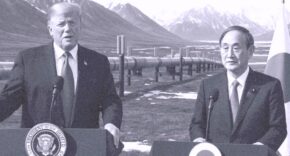The average American is waking up today and if driving to work they are paying more for a gallon of gas now that at any point in their lives. This hurts. As the great economist Mike Tyson once said, “Everybody has a game plan until they get punched in the mouth.”
The American worker is in need of a game plan in the form of lower gas prices. This is the surface story that everyone gets. Higher gas prices bad. Lower gas prices good. Unless of course you are Stephen Colbert or some other Tesla driving SoCal idiot who thinks that paying $15 a gallon for gas is good because it is helping the Ukrainians. The underlying micro-economic issue currently is the effect that the sanctions are having on the petrodollar and whether an end to using petrodollars would be a death knell for the U.S. economy.

So what exactly is a petrodollar and why is it so important? We have to go back to the early 1970’s and the collapse of Bretton Woods and the U.S. going off of the gold standard. The U.S. jumped from one commodity, gold, to a new commodity, oil. The United States struck a deal with Saudi Arabia to standardize oil prices in dollar terms.
Through this deal, the petrodollar system was born, along with a shift away from pegged exchanged rates and gold-backed currencies to non-backed, floating rate regimes. As such, the petrodollar system elevated the U.S. dollar to the world’s reserve currency and, through this status, the United States enjoys persistent trade deficits and is a global economic hegemony.
It’s obvious for many reasons that having oil sales denominated in U.S. dollars is beneficial, including:
- Petrodollar recycling creates demand for U.S. assets when dollars received for oil sales are used to buy investments in the United States.
- Recycling of petrodollars is beneficial to the greenback because it promotes non-inflationary growth.
- A move away from petrodollars could potentially increase borrowing costs for governments, companies, and consumers if sources of money become scarce.
So what could go wrong? Spoiler alert – China! The reason that people are beginning to talk about this again is because of the rising price of oil, as previously mentioned and its effect on the macroeconomic economy. Let’s do the math before we do the politics. According to the U.S. Energy Information Administration, the U.S. is now among the top oil producers in the world. We once imported 2 million barrels of Saudi crude a day in the early 1990’s, but those numbers have fallen to less than 500,000 barrels a day in December 2021.
In contrast, according to data from China’s General Administration of Customs, China’s oil imports have swelled over the last three decades, in line with its expanding economy. Saudi Arabia was China’s top crude supplier in 2021, selling at 1.76 million barrels a day, followed by Russia at 1.6 million barrels a day. No one seems to be mentioning wind mills or solar at the moment. But I digress.
With China buying more than 25% of its oil from Saudi Arabia, the idea of the Saudi’s pricing oil in the yuan becomes an option. If priced in yuan, those sales would boost the standing of China’s currency. The Saudis are also considering including yuan-denominated futures contracts, known as the petroyuan, which would take it ever closer to using yuan instead of dollars.
This my friends is huge. Forget BLM and transgender college swimmers, this has the potential to change the everyday lives of Americans in the future. Just last month, it was reported that China and Russia agreed to a 30-year deal to provide gas settled in euros. Before that, even allies were considering mechanisms to price oil outside of dollar settlement. Eloquently stated by Mike Ippolito of Blockworks, “The enormity of this disruption can’t be understated. Particularly as financial exclusion is rapidly becoming the chief policy instrument of the western world.”
After the war in Ukraine ends, the long term question the world will ask is do we want to continue to keep our assets in a financial system that is obviously subject to the best interests of the U.S. The answer to date has been an unequivocal yes. Who would want to partner with totalitarian regimes like China, Russia or Iran? Well, any country who wants to stay warm in the winter currently. Just look at Texas a couple winters ago and see how well the alt-energy worked for them. Yes, Austin is a southwestern epicenter of liberalism, but at least currently a far cry from Moscow or Beijing.
Yes, the Saudis still plan to do most of their oil transactions in dollars, which represent about 80% of denominated oil. The Saudi move could chip away at the supremacy of the U.S. dollar in the international financial system, which Washington has relied on for decades to print Treasury bills it uses to finance its budget deficit. In a startling statement in the Wall Street Journal by economist Gal Luft, co-director of the Washington based Institute for the Analysis of Global Security, he stated, “The oil market, and by extension the entire global commodities market, is the insurance policy of the status of the dollar as reserve currency.
If that block is taken out of the wall, the wall will begin to collapse.” This will ultimately be a geopolitical battle between the usual suspects, with the financial security of the U.S. hanging in the balance.











